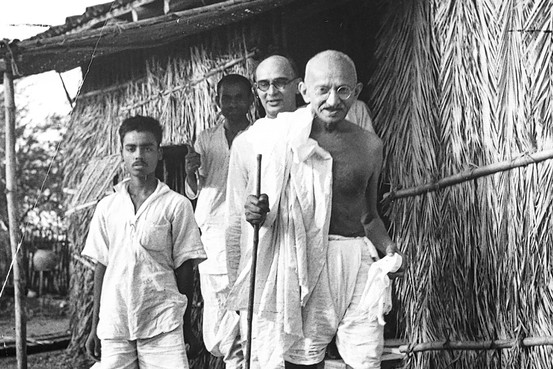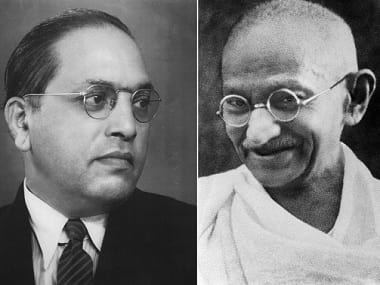ENGAGEMENT WITH THE CLASSICS
Invoking Soul Force: Revisiting Hind Swaraj
Even though there are many critiques of the project of Enlightenment and Western modernity, Mohandas Karamchand Gandhi’s Hind Swaraj—a simple/dialogic text written in the context of colonial India and its quest for swaraj—continues to enchant us. Gandhi’s reflections on modernity and civilization, machinery, medicine, law and parliament, and his plea for soul force characterized by a deeply politico-spiritual mode of resistance make us see and feel the discontents of modernity. A young teacher/researcher engages with Hind Swaraj, and makes this remarkably illuminating text alive.
Urmi Bhattacharyya is a doctoral researcher at the Centre for the Study of Social Systems, School of Social Sciences, Jawaharlal Nehru University, New Delhi. She is currently teaching sociology at Sri Venkateswara College, University of Delhi.
The inception of the idea of ‘modern’ emanated in the context of European Enlightenment, where the use of reason and rationality was sought to do away with dogmatic beliefs and ideologies. Considered to free human thought and agency from the control of overarching institutional discourses and practices, the age of Enlightenment marked a watershed in the development of human thought and civilization. Signified by technological development, advancement also led to discoveries, intellectual interventions as well as the growth of the market in Britain and other parts of Europe. Overpowered by the expansion in production and the growth of the economy, discrepancies in the era signaled as the age of Enlightenment began to show. Economic growth led to the further expansion of markets, outside Europe, thus resulting in
the creation of colonies in the non-Western countries. The idea of modernity, which was believed to free human beings from shackles of control and domination, began to be associated with instrumental rationality, endeavored to foster the economic development of Britain. In the construction of colonies in the non-West, the idea of the modern was seen to be coterminous with Westernization. The project of modernity, marked by industrialization was carried out in these colonies. What turned out to be a tool of emancipation for one half of the world, became a tool of domination for the other half. Through ideological control, the British government then justified their rule over the colonies. In the context of India, where anti-colonial struggle took place over the 19th and 20th centuries, there grew a rift in terms of approaches to the development of nationalism. It was during this period of widening gap between the moderates and the extremists in the Indian National Congress, that M. K. Gandhi wrote the Hind Swaraj. Discussing on themes of machinery and modern occupations, to the idea of a true civilization and the possibility of its advancement through the maturity of soul-force of every individual, Gandhi presented an alternative to colonial modernity. Extending his ideas on self-rule and self-government in questions pertaining to national identity in the present day, Gandhi’s ground-breaking philosophy of Satyagraha as being intrinsic to the attainment of Swaraj, finds relevance even in the present day, not only in the discussions pertaining to colonial India and the nationalist struggle, but in the contemporary discussions of the politics of power and identity.
Presenting his central concerns in the genre of a dialogue between the reader and the editor, Gandhi posited the idea of Swaraj not as a utopia, or a dream, but that which through the form of a discourse can be put into action. Underscoring the main themes that were central in the formation of political parties, their ideologies and their framework of action in the nationalist struggle, Gandhi sketches the philosophical connotations of the concept of Swaraj. Historically, it was the Partition of Bengal that instilled a new sense of nationalism in India – one backed by force. The situation of unrest and strife could be attributed to a general ambience of discontent, and Gandhi believed that this feeling of discontentment was a necessary precondition for any reform. However, it was the very content of this reform and the manner in which it was conceived, that perturbed Gandhi. Driving away the colonizers was significant but not the central essence underlying Swaraj. The physical and numerical absence of the British from administration, but a continuation of their political, economic and military pursuits and practices, was not Swaraj.
For many Western-educated Indian intellectuals whose ideas of progress emerged in line with the rational and evolutionary paradigm of modernity in the West, the attainment of freedom and the development of the nation implied a reiteration of these principles of European modernity in Indian society. What Gandhi asserted in this context was not a complete rejection of Western rationality, but rather an accentuation on those aspects of tradition and ethical rationality that have been conceptualized through Indian experience. The problem therefore lay in the blind replication of the social institutions and practices of the West as yardsticks of development and modernity. Gandhi was of the view that the idea of modernity as it emerged in the West was closely related to industrialization, and therefore associated with principles of materialism. The material development which gave birth to machinery had become subject to the latter. Its appropriation in the Indian society could therefore never lead to Swaraj. The growth of human civilization from a state of relative savagery to development was thus associated with the ceaseless reproduction and procurement of goods and services that reiterated the mantra of material expansion. It is in this light that the true meaning of self-rule and self-government had to be interpreted by every individual, as an endeavor that emerged from within.
By highlighting on historical events and the general conditions and issues in particular that framed the larger conceptual understanding of nationalism in the country, Hind Swaraj unfolds a deeper and substantial meaning of the idea of Swaraj in terms of the relation between individual and society. By critiquing the Western project of modernity in the context of colonial India and its repercussions on human action in general and in particular on the transformation of labour, occupations, transport and communication, law, medicine and education, Gandhi tried to define Swaraj as self-rule and self-government beyond the boundaries of ever-deepening materialism, to connote a sense of moral duty and welfare.
Increasing intervention and domination of the machinery and its concomitant idea of materialist development would, as Gandhi pointed out, mark a shift from manual labour to machine labour. That which was earlier carried out with one’s hands and feet would now be performed with technological equipments. It is then in the idea of the degradation of manual labour in the light of industrialization that one could possibly draw a congruity between Gandhi and Karl Marx. What Marx narrated was also a similar problem that lay in the control of human action and thought by the machines, and the degrading condition of the workers, who in the modern industrial society were nothing but appendages to the machines that controlled their actions as well as perception and understanding. However, manual labour to a considerable extent is bonded, toilsome, not always the expression of personal creativity, and is apprehended as the option available in the absence of relatively ‘higher-skilled’ work. Although the interpretation of skilled labour in the context of a modern civilization based on machinery and materialism can itself be questioned, Gandhi’s idealization of manual labour as perceived in relation to moral duty in society fails to acknowledge the central element of exploitation and inequality that are sometimes intrinsic to its delegation to certain sections of the population in a community or society. Nonetheless, Gandhi’s notion of labour has a philosophical underpinning, including a sense of self-control and it is in the context of overarching materialism and technological development, that he presents the idea of labour in terms of development and Swaraj. Embraced in the world of material prosperity and progress, human beings are bounded with steep and ever-rising concrete walls of temporal, tangible, machine-induced traces of what is now recognized as being the tenets of a civilization, and it is in this frame of understanding that Gandhi critiques machinery and highlights on manual labour.
Attributing the reason for colonial domination as the inability on the part of the natives to prevent the ingress of the British into the subcontinent, Gandhi states that the failure was in part due to the incapacity of the natives to look for qualities of strength in oneself, the failure to develop a common social consciousness beyond the confines of religion and caste-based identities and thereby extol the colonial traders. Internal differentiation, inequality, quest for power, all contributed to the entry of the British into the country. Wary of the modern secular and rational ideology that emerged in India, founded on the values and ideals of the Western industrial civilization, Gandhi was apprehensive of the gradual disappearance of religion from the lives of the people. The concept of religion in this sense however, referred to the idea of dharma as used in the Bhagavad Gita, which accentuated on an understanding of civil religion that lay above all religious sects and ritual practices. Not promoting or overlooking the superstitious and dogmatic elements present in organised religions, in the light of the material-centred rationalist ideology that attempted to reduce religion to a body of superstitions, Gandhi endeavored to redefine religion as a national, collective civic duty akin to the notion of dharma. This aspect of religion, he believed, was the source of ethical rationality in a civilization. It was through the religious scriptures that a sense of moral duty could be defined in a society, one which instilled a sense of self-control and concern for others.
Acknowledging the creations of the colonial government, nationalists were largely critical of the commencement of railways, developing their larger argument surrounding the primacy of irrigation facilities required for the eradication of poverty from the villages (Parel, 2009). Gandhi also expressed his reservation about the introduction of the railways, stating that it was developed by the British to primarily serve the interests of their market, and would therefore have an adverse effect on the local distribution of goods in the rural countryside. Encouraging the idea of relatively self-sufficient villages, characterized by locally produced economy and political autonomy, Gandhi dissuaded the nation from falling prey to modern amenities, occupations and services that were all marked in an aura of rationally progressive development that promoted the consumption of materialist ideology and lifestyle in the name of civilization, but at whose very root lay the industrial and colonial intention of the creation of a mass market of goods and services. Critical of the modern legal system that was introduced by the British in India, Gandhi stated that its function was to authorize colonial intervention and domination. Natives were included in the system to make the colonial sanctions and rules appear to look less foreign and thereby to justify their administration. As for the new occupations that developed as a result of the modern civilization entrenched in the principle of material progress, Gandhi observed that doctors and lawyers whose jobs were rooted in the value of service, often emphasized on material gain and promotion in their professions. Cloaked in the name of modern occupations, he believed that such tasks should not seek to centre their development around private and material gains and profit, but in the service of others.
Throughout the text, Gandhi persistently stresses on the problems that the country faced under colonial rule that had to be taken into consideration before assimilating a nationalist movement for the freedom of the country. The source of evil, for Gandhi, was the growing preoccupation with the glittering civilizational modernity of the West – one that was centred on the edifice of materialism in all aspects of development and welfare – of which colonialism was an offshoot. Freedom from the colonial rule though use of means tagged as ‘modern’ and rational by the British was where the problem in Indian nationalist struggle lay. For it was not only through the overthrowing of the British administration in India, but the obliteration of Western concepts and categories of progress and modernity from Indian society that India would attain self-rule. Swaraj, in the context of Indian society would find its true meaning when foreign institutions, values and practices assumed to be the yardsticks of modernity and development would be replaced by self-government and self-rule that highlighted on civil religion, collective morality and social welfare.
By ensuring quick relief from pain and suffering, Gandhi noted, medicines too served the interests of the consumption-driven materialist civilization, by providing temporary relief and thereby increasing the bodily dependency of individuals on doctors and medicines. The complete well-being of individuals was indispensable to the development of a civilization beyond materialism, and it is in this light that Gandhi introduced the significance of the soul in relation to the advancement of a civilization. Self-rule and self-government, Gandhi asserted, can only emerge when the development of the Indian society is based on an experience of the past. This experience confirms a sense of common morality and a call for duty. Just as control over the body is required for good health, so is discipline required for the control of the mind. Dominated by machinery, the modern Western civilization redefined the health of an individual and the nation as being dependant on the consumption of materialistic ideology, products and services. A true civilization, which Gandhi believed India would develop into, would however move beyond material gains and temporal pursuits, individual interests and profit, to the welfare of the body and the soul of self and others, and that of the human species and the nation as the whole.
Material comfort is necessary but not imperative for the contentment of the human soul. Idealizing on the image of self-sufficient villages bound by the values of duty and welfare, and not simply by technological development and material satisfaction, Gandhi spoke of contentment and maturity based on the control of senses and bodily activity by the mind as the core symbol of a true civilization. Not overlooking certain ill-practices and social evils that have also been a part of the Indian society, Gandhi spoke about the rise of a “new spirit” (2009: 69) that was made possible due to the British rule in India. This new spirit that evolved in the context of colonialism enabled the native to restructure experience through a critical interpretation of their history and cultural practices, and thereby highlight on those aspects that motivated towards a holistic development and do away with those that tried to bring about social inequality.
Maintaining the view that it was the adoption of Western practices and institutions that contributed to colonial domination in India, Gandhi affirmed that Swaraj in its true sense of the term was then possible only when those individuals who were influenced by Western materialism, carried out a self-transformation in their own lives and surroundings by disciplining their senses and behavior, by structuring their thought and action – by self-control rather than being instruments of a colonial modernity. The real enemy of the natives in the context of colonial India was therefore not just British government. In fear of having misunderstood his argument, it is essential to repeatedly keep in mind that the central concern for Gandhi was not the presence of English people in India, but the ideology of colonialism and domination in general – which transformed individuals into passive recipients of external control that directed their thought, understanding and experience. The colonial rule – a result of the expansive conquests of industrialization was one such context of foreign rule. Swaraj, would not only mean the removal of foreign control over administration and practices, but at an individual level, the freedom from any external control over mind and thought, brought about by a sense of self-discipline and an interest in the welfare of others. Violence was therefore not an answer to freedom from colonial domination, as freedom and the enhancement of the soul is as important as that of the body. And moreover the violent measures, assumed to usher freedom from colonial domination were themselves an outcome of the Western materialist civilization, as through such means, even though the presence of the English could be controlled, their domination would still continue through the ideology of ‘modernity’. Their instrument of control could never be used to bring about Swaraj for India. The use of physical and instrumental violence made possible through technological evolution, resulted in a civilization that emphasized on material progress and a narrow rationality. Development of a true civilization had to ensure the maintenance of certain values that focused on the welfare of the nation. The modern civilization of the West encouraged individuality and brute competition. If Swaraj had to introduced, there had to be certain ethical dimensions taken into consideration, one that also accentuated on the development of the soul, beyond the body and therefore beyond individualism, to social welfare and wellbeing, beyond mere temporal materiality to dharma.
It is in this context of the significance of the human soul that Gandhi developed the principle of passive resistance or what he coined as Satyagraha – the resistance which stood firmly on the grounds of soul-force, not violence. The history of passive resistance, which has largely been neglected in terms of documentation, involves the non-involvement or non-cooperation of individuals in any action that defies their conscience. Although the modern, colonial ideology of civilization appears to be liberal and rational in scope, it entails an uncritical acceptance of the law as a duty. The path of Satyagraha however, as envisioned by Gandhi recognizes the need for resistance when the law fails to represent the ideals of ethics, welfare and moral duty. Unlike violence therefore, which exhausts itself in the process, passive resistance continues itself till the end. But this type of resistance requires disciplining of the body as a form of control over the mind. Moreover, it should imbibe values of chastity, truthfulness, fearlessness and abstinence from indulging in material prosperity.
In this context, Gandhi recognized that the real purpose of education lay in disciplining the soul by deciphering meanings and structuring ethical principles in the society. To do so, it was quintessential for the natives to reestablish the Indian languages whose categories are themselves structured by historical experience, and help in the conceptualization of thoughts, practices and future experiences. The education of ethics in this sense was therefore possible by revisiting religious scriptures. The attempt to stop the domination of Western civilization was to introduce indigenous languages that were non-foreign in context, rooted in the culture of the country, and through which the principles of ethics could be shared, not with the intent of developing fundamentalist ideology prominent in organized religious sects, but to emanate a sense of moral duty and dharma throughout regions, which would ultimately become characteristic of Indian civilization.
The central concept of Swaraj as underscored by Gandhi throughout the text of Hind Swaraj, therefore begins with the transformation of every individual, marked by self-control and the development of the soul-force, as opposed to bodily force and violence. The internalization of the essence of Swaraj by individuals would therefore presume the disapproval of foreign material products as well as ideology; in other words, it would refer to a sense of rule or control of every individual by their conscience and ethical duties towards each other, and a decolonization of the mind as well as the body. Using Gandhi’s symbol of the spinning wheel, one can envision the ideals of Swaraj, which start from the individual and extend to the nation, not manifested in material power and superiority, but where just like the spokes of the wheel, every individual is connected to each other through the core ideals of a true civilization, based on a mutual respect for ethics and the priority of welfare – where mind is not controlled by violence or brute force, but by the self and a common consciousness; where every action entails at the preservation of such consciousness of morality and ethics, thereby ushering a substantial development of the body and soul of the nation. Swaraj only in this sense would ensure and signify a sense of freedom from all forms of material and ideological control and its replacement by self-control of every individual, not in the form of a recognition of their ego, but as a realization of their soul-force. The Swaraj then developed, would be Swadeshi, in thought and action.
Gandhi’s discourse of humanism as the highest form of social and political philosophy therefore exceeds beyond the timeframe of colonialism in India, to the present day, when forces of neo-liberalism and materialism dominate and colonize the perception and understanding of every individual, when the use of material domination is also accompanied by instrumental violence, when technological intervention kills human creativity and the sense of community by building barriers of surveillance consisting of alienated individuals. In a world where relentless production of goods and ideologies create pools of skilled labour, where baseless industrial growth and consumerism reiterate the ideology of the powerful, where the ability of action in the form of words and thoughts to transform human condition and civilization (Arendt, 1958) and the potential of feelings and inner experience to transform the space of human action, are all subdued in the massive project of ever-growing production and control, endeavored to turn human civilization into colonies for the transmission of mechanized thought and action; Gandhi’s path-breaking work on the potential of the soul-force and passive resistance as true Swaraj finds a new meaning every time a reader confronts it.
References:
Arendt, H. 1958. The Human Condition. Chicago: The University of Chicago Press
Gandhi, M. K. (Ed. Parel, A.) 2009. Hind Swaraj and Other Writings (Centenary Edition). New Delhi: Cambridge University Press
This article is published in The New Leam, NOVEMBER-DECEMBER Issue( Vol.2 No.16-17) and available in print version. To buy contact us or write at thenewleam@gmail.com
If You Liked the article? We’re a non-profit. Support This Endeavour – http://thenewleam.com/?page_id=964













